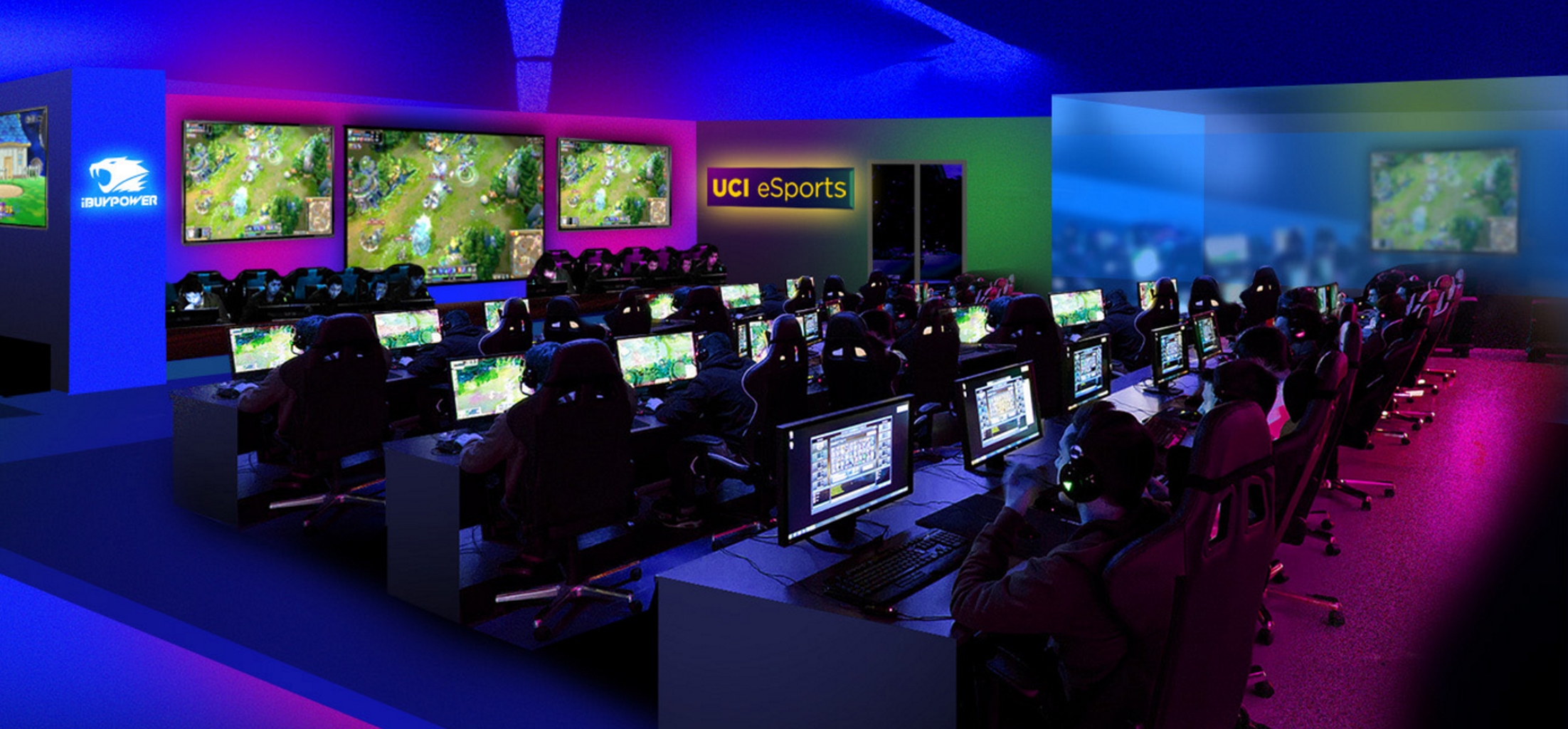The University of California Irvine became the biggest public school to institute an esports scholarship program in March when it revealed plans to offer 10 scholarships for esports competitors and a plan to build an esports arena modeled after Korean PC bangs. Those plans are now coming to fruition.
The arena, sponsored by gaming PC maker iBUYPOWER, will open on Sept. 23. It’s a 3,500 square foot facility featuring 80 custom-built PCs and a live broadcasting studio designed to showcase collegiate gaming action to thousands of fans on Twitch.
Students will be able to play in the arena by paying $4 an hour, and they’ll receive a complete PC bang experience thanks to Riot Games if they opt to play League of Legends, with every champion unlocked, a 50 percent experience boost, and a 20 percent IP boost, plus access to over 100 skins. It’s the first time LAN center rewards of that type have been offered in North America, though those kind of perks are common in Korea, where PC bangs are big business.
In addition to providing high powered gaming machines for the endeavor, iBUYPOWER is also helping cover some of the scholarship and expenses. Logitech, Asus, and Vertagear also provided peripherals, monitors, and chairs for the operation.
That means that UCI’s new recruits, a lineup of talented semi-pro and even former pro players for its League of Legends team, will get to train on some sweet setups.
Headlining the roster is Lyubomir “BloodWater” Spasov, the former support for LCS teams Vulcun and XDG Gaming. Spasov represented North America at the 2013 World Championships, at the time considered one of America’s top talents in League of Legends, but disappeared from the scene after XDG Gaming’s surprising crash out of the LCS. Over the past year he’s competed on two teams that failed to qualify for the Challenger series. Now he’s bringing his talents to the collegiate scene.
“UCI’s new eSports program gives talented League of Legends players the opportunity to study what they love and to continue their passion for competitive gaming,” Spasov said in the press release. “When I heard about the scholarship, I was very happy to know that I had a chance to attend one of the best universities in California—or anywhere—and to earn a degree in computer science.”
He’ll be joined in the bottom lane by another player with LCS experience, James Lattman, who played nine games for Team Dragon Knights as a substitute in the Summer split last year. He will be paired with fellow AD carry Parsa “Frostalicious” Baghai, who substituted for Trevor “Stixxay” Hayes during a suspension on Counter Logic Gaming Black last year.
Irvine’s mid lane will featured Youngbin Chung, no stranger to the collegiate esports scene. In 2015 he reached the finals of the biggest collegiate competition in League of Legends, the North American Collegiate Championship (NACC), as a scholarship player for Robert Morris University, the first school to introduce esports scholarships. He left that team to join Team Liquid Academy and served as a backup for Team Liquid during the Spring split of the LCS this year, but he’s returning to school with another scholarship at a stronger school academically.
The jungle spot will be filled by Loc Tran, another player with experience in Challenger qualifying as well as collegiate competition, a runner-up at the NACC in 2014 while he attended San Jose State University, which does not have an esports scholarship program.
The top lane position is currently open, as are multiple backup spots, though apparently Justin “Pupper Reformed” Choi, star of UC Irvine’s club League of Legends team, has the inside track for the position.
“On paper, UCI will have the best collegiate team in the world,” Mark Deppe, UCI acting director of esports, said.
The players will receive scholarships covering about $15,000 in tuition and fees, and will be able to keep all prize money earned through esports competition. That’s a good deal, especially at UCI, which is the first public research university to introduce an esports program. The school was ranked as the top in the nation for gamers by College Magazine last year, and this new program will be another reason why that’s still true.
“Video games often get a bad rap, but research increasingly shows the positive impacts that games can have in science, medicine and education,” Rebecca Black, UCI associate professor of informatics, said in a press release. “UCI’s eSports initiative can foster team building, effective communication and critical thinking in nontraditional ways. These skills should serve students well for the rest of their lives.”

